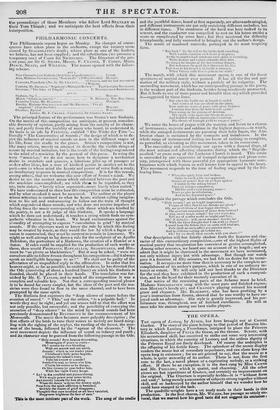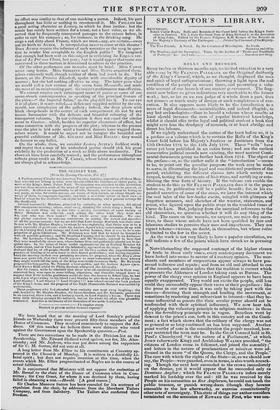THE OPERA.
TI1E opera of Lestocy, by AUBER, has been brought out at Covent Garden. The story of time piece belongs to that period of Russian his- tory in which Lestocq, a Frenchman, intrigued to place the Princess Elizabeth, daughter of PETER the Great, on the throne. SCRIBE, with his accustomed skill, has contrived to strike out some very interesting situations, in which the cunning of Lestoeq and the artless dignity of the Princess Royal are finely developed. Of course the underplot is the offspring of his fertile fancy. The splendour of the scenic display renders the music but of secondary importance, and can alone keep the opera long in existence ; for we are grieved to say, that the music as a whole, is quite unworthy of its author. There is not, from the first note to the last, a novel phrase or a captivating melody, or a striking effect. If there be an exception, it is the duet sung by Miss Cawss and Mr. Plumes; which is quaint, and charming. All the other pieces are but repetitions of Gustave, and certainly no improvement on the original. The Overture is especially feeble—it is "without form and void ;" being merely a succession of subjects strung together without skill, and so hackneyed by the author himself that we wonder how he could have stooped to the task. The quadrille-wrights have a set ready made to their hands in this production. In the first chorus, Mr. WILSON, has passage so uttely un- vocal, that we marvel bow his good taste did not suggest its omission; its effect was similar to that of one mocking a parrot. Indeed, his part throughout has little or nothing to recommend it. Mr. PHILLIPS has a good acting character as Lestocq, to which he does justice: but the music has surely been written for a tenor, not a bass voice, as we ob- served that he frequently transposed passages to the octave below, in order to suit his compass ; as, for instance, in the drinking .song. He sings a sad ditty about France, which we trust—nay, are certain—owes not its birth to .A USER. Is interpolation never to cease at this theatre ? Does AUBER require the infusion of such narcotics as the song in ques- tion to render him acceptable to the English public ? We imagined that enough had been said on this subject in criticizing :he Eng,ish ver- sisn of Le Fr g aux Clercs, last year ; hut it would appear that some one concerned in these matters is determined to adhere to the practice.
Of the other performers our remarks must be brief. Miss CAWSE never sung better. Miss SHIRREFF and Miss BETTS acquitted them- selves extremely well, though neither of them had much to do. The former, as the Princess Elizabeth, spoke with considerable dignity of manner ; but she had nothing effective to sing. The latter gave what we would call a new version of the scene from Mesanfrllo, and made the most of an uninteresting part. GUIBILEI'S performance was effective. We cannot employ such extravagant terms of praise as some of our scene-struck contemporaries in speaking of the principal feature of the piece—" the Imperial Salon," as the play-bill has It. To our eye it is all glare ; it wants relief,—a deficiency supplied neither by the site, mould, nor complexion of the gallery : indeed, the deep green with black sheep-heads in the centre of each compartment do not by any means harmonize with the delicate and beautiful colouring of the transparent columns. In our estimation it does not equal the similar scene in Gus/are; which, besides its superior chasteness of effect, had some connexion with the progress of the plot ; whereas in the present case the plot is laid aside until a hundred dancers have wagged them- selves weary. It would be unjust not to eulogize the beautiful and graceful exhibitions of Mr. GILBERT and Miss Bawls:: they would do honour to any ballet.
On the whole, then, we consider Zestoce ACRES'S feeblest work ; and regret that a man of his undoubted genius should risk his great celebrity by the production of a work so little above mediocrity. The choruses have been carefully trained ; and the performance throughout reflects great credit on Mr. T. COOKE, whose talent as a conductor we are always glad to acknowledge.




























 Previous page
Previous page